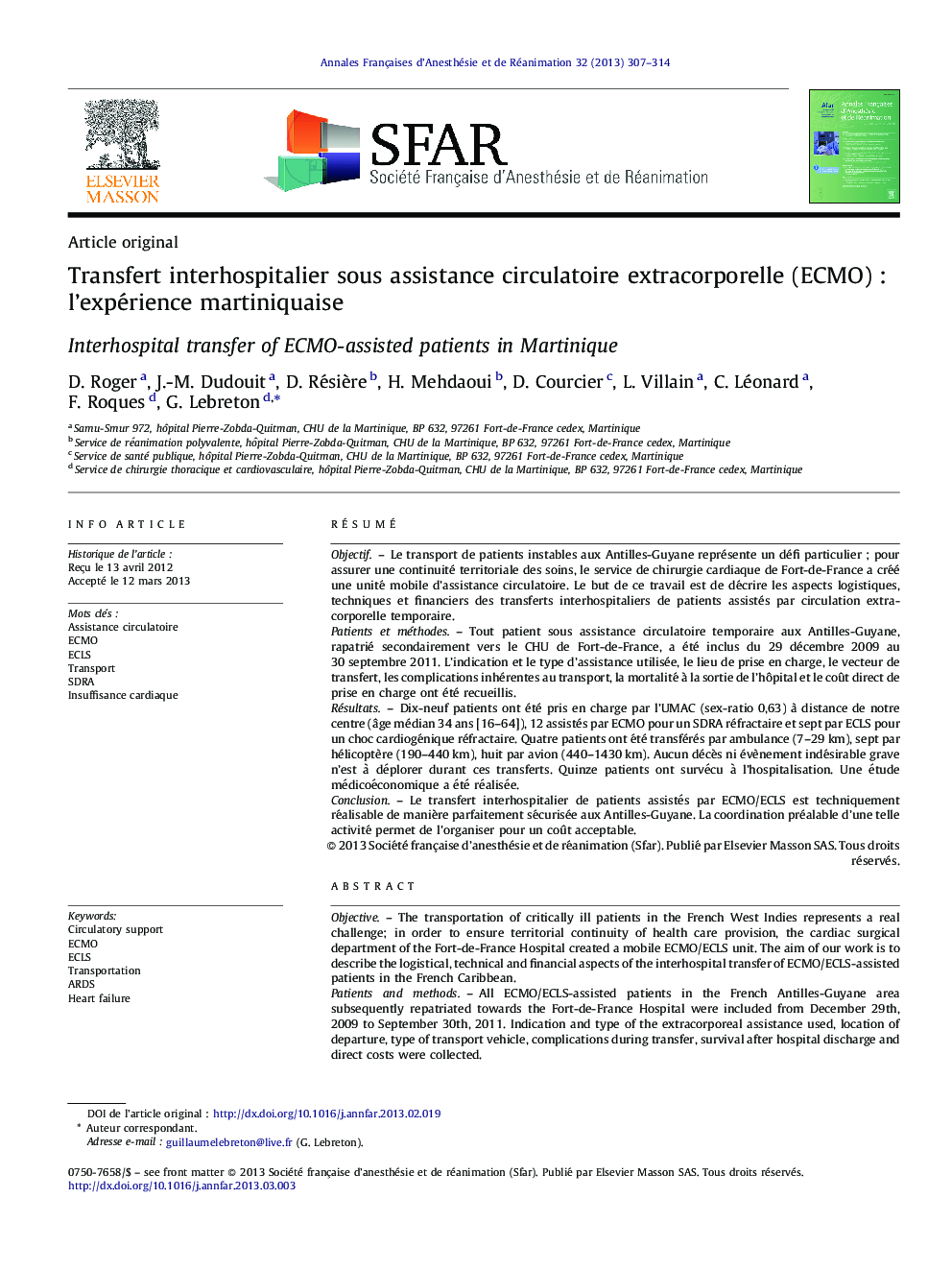| کد مقاله | کد نشریه | سال انتشار | مقاله انگلیسی | نسخه تمام متن |
|---|---|---|---|---|
| 2745534 | 1148839 | 2013 | 8 صفحه PDF | دانلود رایگان |

RésuméObjectifLe transport de patients instables aux Antilles-Guyane représente un défi particulier ; pour assurer une continuité territoriale des soins, le service de chirurgie cardiaque de Fort-de-France a créé une unité mobile d’assistance circulatoire. Le but de ce travail est de décrire les aspects logistiques, techniques et financiers des transferts interhospitaliers de patients assistés par circulation extracorporelle temporaire.Patients et méthodesTout patient sous assistance circulatoire temporaire aux Antilles-Guyane, rapatrié secondairement vers le CHU de Fort-de-France, a été inclus du 29 décembre 2009 au 30 septembre 2011. L’indication et le type d’assistance utilisée, le lieu de prise en charge, le vecteur de transfert, les complications inhérentes au transport, la mortalité à la sortie de l’hôpital et le coût direct de prise en charge ont été recueillis.RésultatsDix-neuf patients ont été pris en charge par l’UMAC (sex-ratio 0,63) à distance de notre centre (âge médian 34 ans [16–64]), 12 assistés par ECMO pour un SDRA réfractaire et sept par ECLS pour un choc cardiogénique réfractaire. Quatre patients ont été transférés par ambulance (7–29 km), sept par hélicoptère (190–440 km), huit par avion (440–1430 km). Aucun décès ni évènement indésirable grave n’est à déplorer durant ces transferts. Quinze patients ont survécu à l’hospitalisation. Une étude médicoéconomique a été réalisée.ConclusionLe transfert interhospitalier de patients assistés par ECMO/ECLS est techniquement réalisable de manière parfaitement sécurisée aux Antilles-Guyane. La coordination préalable d’une telle activité permet de l’organiser pour un coût acceptable.
ObjectiveThe transportation of critically ill patients in the French West Indies represents a real challenge; in order to ensure territorial continuity of health care provision, the cardiac surgical department of the Fort-de-France Hospital created a mobile ECMO/ECLS unit. The aim of our work is to describe the logistical, technical and financial aspects of the interhospital transfer of ECMO/ECLS-assisted patients in the French Caribbean.Patients and methodsAll ECMO/ECLS-assisted patients in the French Antilles-Guyane area subsequently repatriated towards the Fort-de-France Hospital were included from December 29th, 2009 to September 30th, 2011. Indication and type of the extracorporeal assistance used, location of departure, type of transport vehicle, complications during transfer, survival after hospital discharge and direct costs were collected.ResultsNineteen patients were supported by our mobile unit far away from our centre (sex-ratio 0.63, median age 34 years old [16–64]). Twelve were assisted by ECMO for a refractory ARDS, and seven were assisted by ECLS for a refractory cardiogenic shock. Four patients were transferred by ambulance (7–29 km), seven by helicopter (190–440 km), and eight by plane (440–1430 km). No patient died during transfer. No major adverse event occurred during these transfers. Fifteen patients survived. An economic assessment was conducted.ConclusionInterhospital transfer of ECMO/ECLS-assisted patients by land or air is technically feasible under perfectly secure conditions in our area. Prior coordination of this activity has helped to make it affordable.
Journal: Annales Françaises d'Anesthésie et de Réanimation - Volume 32, Issue 5, May 2013, Pages 307–314